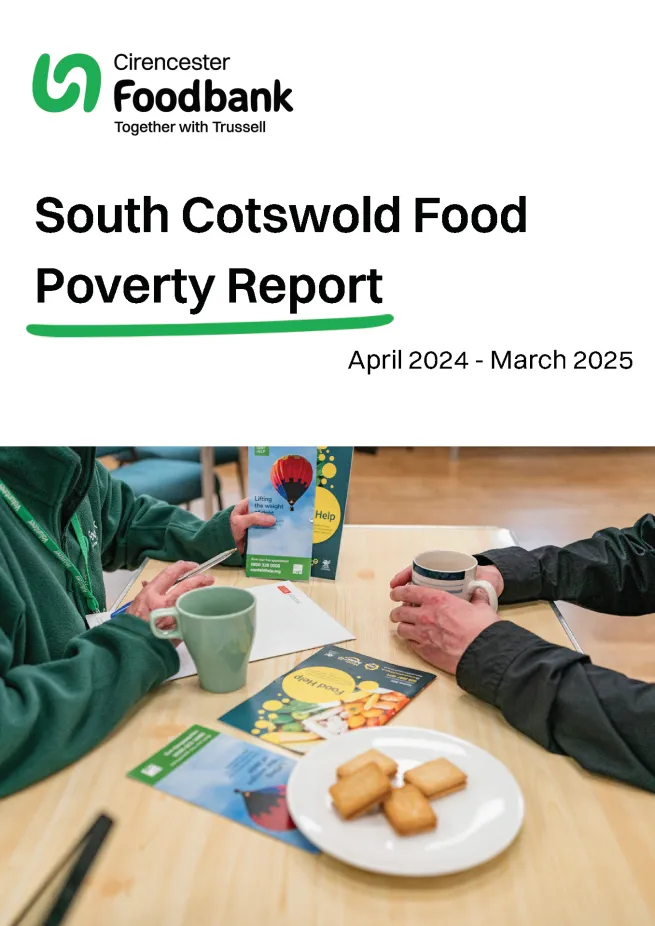
Cirencester Foodbank’s latest data shows working families, single men and isolated communities facing rising food insecurity — with nearly half of referrals linked to poor health and housing debt.
A new report has revealed the persistent – and often hidden – scale of food poverty in the South Cotswolds, urging local policymakers and residents to take action through targeted, community-based support.
Key findings from the report:
● 35% of referrals involved people in work
● 70% of referrals named women, but single-adult households were more likely to be men
● 72% of men referred lived alone; 75% relied solely on benefits
● 47% also have physical or mental health issues
● 50% of clients receiving debt advice through the Foodbank were also struggling with
housing-related debt
● 41% of family referrals came directly from schools
● 37% were first-time foodbank users
● 20% of cases were triggered by unexpected expenses
The South Cotswold Food Poverty Report 2025, published by Cirencester Foodbank, paints a concerning picture: working households, single men, and families with children are increasingly struggling to afford life’s essentials.
While 70% of referrals named women—often reflecting caregiving roles and a greater willingness to seek help—referrals involving single-adult households were more likely to be men. Of the men referred, 72% lived alone and 75% relied entirely on benefits, highlighting the isolation and financial vulnerability faced by many.
Health issues are a growing driver of foodbank referrals. The report reveals that 47% of clients are living with a long-term health condition or disability, and many face delays or denials in accessing benefits such as Personal Independence Payments (PIP).
These health issues are compounded by poor housing, limited transport, and increasing costs for essentials, creating a cycle of hardship that affects physical and mental wellbeing. 35% of those receiving support were in work, underlining that food poverty is no longer confined to those who are unemployed.
Anton Wynn, CEO of Cirencester Foodbank, said: “This report confirms what many of us on the frontline already know: hunger in our communities isn’t caused by a lack of food – it’s driven by a lack of income. Behind every food parcel is a complex story of rising costs, poor access to support, and people slipping through the cracks. “Families remain on a knife edge – particularly during school holidays – with rising living costs, benefit shortfalls, and the erosion of support roles in schools leaving many without a safety net.”
Despite a small reduction in overall foodbank use compared to the previous year, thanks in part to targeted financial support and grassroots initiatives, the report found that 37% of clients were first-time users, many experiencing sudden financial crises such as redundancy or spiralling energy bills.
The report also highlights unique rural challenges in areas such as Fairford, Lechlade, and Tetbury, where transport barriers, limited services, and social stigma often prevent people from accessing the support they need.
To help meet this rising need, Cirencester Foodbank is urging the public to use the ‘BanktheFood’ app, a free, easy-to-use tool that lists exactly what local foodbanks need when and sends an alert on entering the supermarket. www.bankthefood.org
Emma Spring, Founder of the charity BanktheFood, which runs a free app to help food banks, said: “This report is a powerful reminder that food poverty can affect anyone, often without warning. At BanktheFood, we believe technology can be a force for good – making it easier for communities to respond quickly and effectively. Food poverty in rural communities can be especially challenging, with isolation, limited services, and stigma making it harder for
people to get help. When people use our app, they’re not just donating tins; they’re delivering dignity, support, and hope exactly when it’s needed most.”
Alongside the challenges, the report also shares stories of hope and progress. In the past year, financial donations have also enabled the foodbank to provide a range of wraparound support services designed to address the root causes of food poverty and help people move toward long-term stability. This includes debt relief and financial support of over £835,000 in debt relief and financial support.
